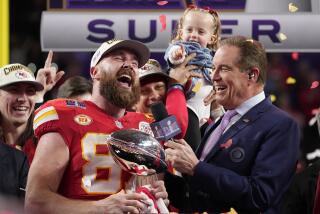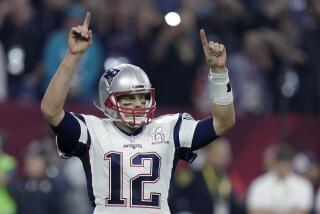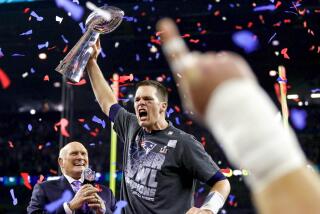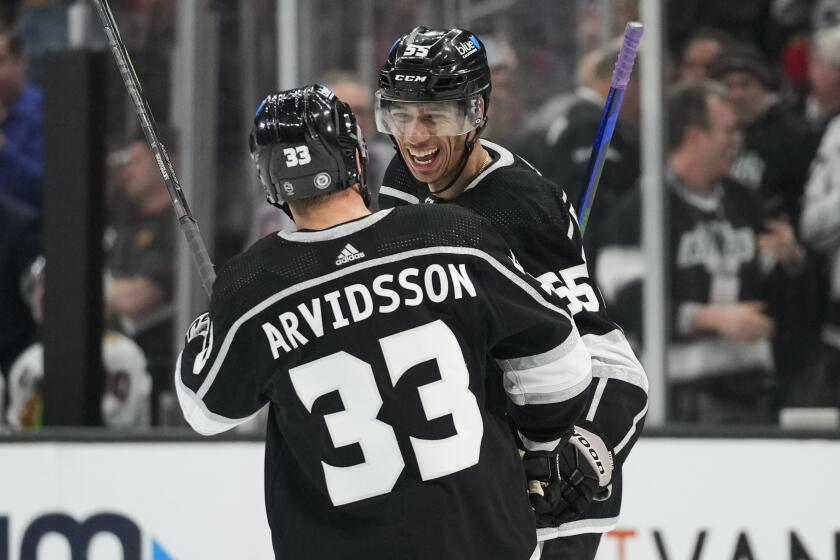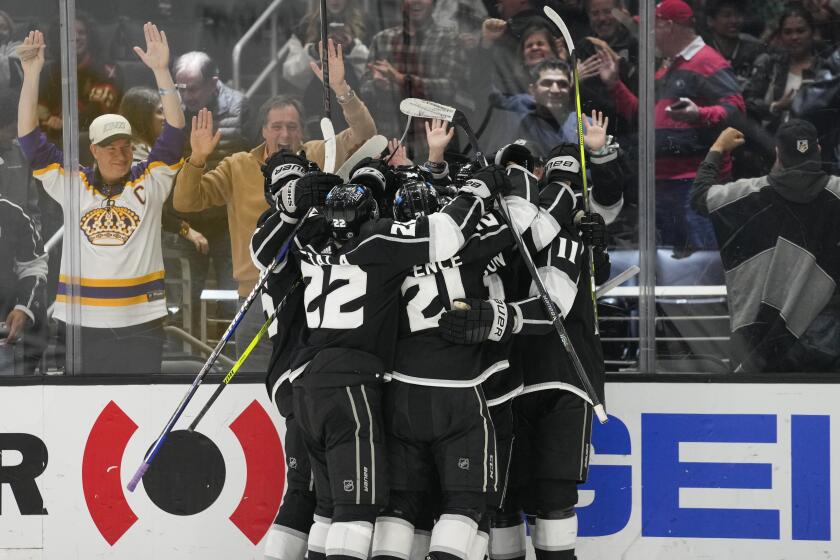Why Patriots Win
During another critical off-season in which next year’s champions will be created, the New England Patriots’ two famous leaders, Bill Belichick and Tom Brady, have but three rivals who might block their drive to a record fourth Super Bowl title in the first five years of the century.
In the order of how the Patriots last beat them — each by greatly different means — the three are the Indianapolis Colts, Pittsburgh Steelers and Philadelphia Eagles, who, along with the Patriots, have incongruously pulled away in a parity era to form the NFL’s Big Four.
A drastic difference in offensive philosophy elevates New England above the others.
Particularly on the big-game days of January and February, these are the specific differences:
The champion Patriots believe passing wins. Hence they’re best described as a passing team that can run if it must.
The Steelers believe running wins. With the NFL’s premiere players overall, they lose by only passing when they must.
The Colts want to win passing but don’t really know how to do it. Believing the fiction that runs set up passes, they waste so much time running the ball that they run out of passing time for Peyton Manning.
The Eagles pass beautifully but have lacked the running threat that every good passing team must have.
Longshots could yet change the Big Four into a big five or more, but any would-be winner will have to overcome Belichick and Brady both. Not easy.
Belichick Changes His Offense Three Times
THE MOST FLEXIBLE leader in American sports — since at least the day of Bill Walsh in San Francisco or Casey Stengel in New York — Belichick is a conservative by temperament but a liberal in action. He scorns the conservative’s playoff-season coaching pledge “to just do what we do better.” Instead, Belichick won his three most important games of 2004-05 by putting three radically different Patriot teams on the field.
In the Super Bowl, the Patriots won with pass offense. After Philadelphia scored first, Brady took over in the second quarter, leading the Patriots on five big passing drives to a red-zone fumble and 24 points for a decisive 24-10 lead in the fourth quarter (on the way to 24-21 decision). As the Patriots drove, their receivers kept racing into the open, if barely, all over the place — near, far and at the middle ranges — each receiver getting to the ball with hardly a split second to spare, uncannily. Those miscalling it “not Brady’s best game” underrate the Eagle defense.
Belichick, a defensive expert, changed to his old run-and-defend style to beat the Colts in what at the time was said to be “the real Super Bowl.” The Patriots spent the day running the ball, in order, as they said, to keep Manning off the field. This strategy succeeded for a typical Belichick reason: His offense was ready with a batch of new third-down passes that surprised the Colt defense whenever early-down Patriot runs failed.
Belichick changed to still a third game plan based on very long passes in order to knock out the Steelers — often said to be the NFL’s best team after they smashed unbeaten Philadelphia and unbeaten New England back-to-back at midseason. The Pittsburgh defense, widely known as the season’s strongest, could have handled anything except Brady’s perfect long passes.
Play-Action Nonsense Beats Manning, Colts
THE COLTS have come up with the NFL’s saddest story of the off-season: Their quarterback throws the ball well enough to still be celebrating a Super Bowl triumph — if only he had thrown it. The play-action series that Peyton Manning executes so spectacularly and loves so much is what beats him so often in big games.
A running threat is essential, but handing off the ball a lot costs Manning the minutes he needs — in what is a relatively short 60-minute game — to get the pass completions he must have to set up the touchdown passes he throws so well.
In his most recent loss to Belichick, 21-3, the day’s pertinent statistic is all but unbelievable. Before that game was out of reach, Manning, whose best passing down is first down, handed off 11 times in 14 first-down plays (excluding the last two minutes of the first half). The Colt runner handed all that opportunity, Edgerrin James, gained but 39 yards that day against the eight-man front that Belichick’s players kept dropping into after their pre-snap jumping around.
The jumps, fakes, feints and other moves the Patriots made along the line of scrimmage — while Manning was calling out the signals — were designed only to confuse a brilliant passer. And confuse him they did. But only because he was watching them. Only because he allowed Belichick to confuse him.
Fancying himself a quarterback, Manning was a sucker for Belichick’s transparent attempts to rattle him, since, in his principal role, he’s not a quarterback but a passer. He need do only two things to compete with the Patriots: Ignore them and throw the ball.
The fact is that with the arm and the receivers he has, Manning needn’t ever try to outguess any defense. He needn’t ever call audibles. He needn’t ever use any of his time-wasting sprint-out stretch plays. He needn’t ever line up in the shotgun formation, which takes away both his indispensable quick pass and much of the James running threat.
And with any game on the line, Manning needn’t ever deploy the Colts in any but their most effective formation — three wide receivers with one tight end and one back, and with Manning up under center. Football’s best passing formation, this can also be the best of all running formations because it spreads four potential receivers along the line of scrimmage to open the field for any fast, quick runner. The ideal time to run is with a safe second-half lead. But when a game is still up for decision in the first half, an occasional run — say, one in every eight or 10 plays — is more than enough to sustain a running threat.
The five Colt receivers who play regularly, including James, are among the finest in football, and on any play, nearly always, one of them will come open an instant after the snap. They and their passer are so talented that all Manning need do, all day, is drop back, turn, and find the open man.
Steelers Can Win with Patriots’ Offense
THE STEELERS’ title-caliber resources are different, but clearly more complete, with bundles of talent on defense as well as offense. This year, in fact, the Steelers could well displace New England with one simple change of procedure. All they have to do is throw out their run-based offense and install New England’s pass-based offense, which their coaches could master overnight because it’s all laid out in the Patriots’ 2004 game tapes.
The first step for Pittsburgh is to realize that in the present passing era, a great defensive team with a run-based offense has no chance to win championship games regardless of how successful it might be in regular-season games. The second step is putting the offense in the hands of quarterback Ben Roethlisberger.
In 2004, Roethlisberger had an exceptional rookie season, showing the pass-play presence and competence of a veteran NFL winner. His critics obviously didn’t notice how badly he was handicapped by the Steelers’ out-of-date offensive strategy. From one week to the next, he was only called on to pass when his opponents anticipated pass — the hard way for any passer to compete.
Roethlisberger’s problems were reminiscent of, indeed identical to, the problems that Hall of Famer John Elway had on so many old-fashioned losing teams before Denver finally brought in a modern passing coach.
Can Eagles Beat Belichick, Brady Both?
THE EAGLES, the most successful of today’s West Coast pro clubs, can be a Super Bowl team again, with a better chance to win this time than last time, if Terrell and Correll play the season injury-free. That’s Terrell Owens, the best receiver in the country, and Correll Buckhalter, the best running back in Pennsylvania.
Off-season handicappers speculate that New England and Philadelphia seem headed for another Super Bowl in large part because Buckhalter, who missed 2004 with injuries, has shown the talent to make the kind of contribution to the Eagles that Corey Dillon made to the Patriots.
With Owens, Buckhalter and Donovan McNabb at their peak and Andy Reid directing, the Eagles seem powerful enough to catch Belichick in a Super Bowl rematch. Whether they can also catch Brady is what’s in some doubt.
The trouble with playing New England is that there are two great artists to beat. No other football team makes that kind of big trouble. For instance, in the most recent Super Bowl, the Eagles held Belichick’s defense to a draw for most of an eventful evening but lost to Brady’s fourth-quarter passing show.
The Patriots have been winning that way throughout the century, beginning in Super Bowl XXXVI, when the Rams tied Belichick in the last five minutes, 17-17, but lost to Brady’s five perfect passes setting up the deciding field goal at the wire. Five perfect ones in football’s toughest 90 seconds. That was awesome. It convinced an old conservative, Belichick, to change his whole life and, as a passing coach, start dominating the NFL.
More to Read
Get our high school sports newsletter
Prep Rally is devoted to the SoCal high school sports experience, bringing you scores, stories and a behind-the-scenes look at what makes prep sports so popular.
You may occasionally receive promotional content from the Los Angeles Times.
